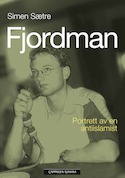A new book released on Wednesday attempts to explain how the quiet son of left-wing radicals on Norway’s west coast turned into the anti-Islamist blogger called “Fjordman.” The blogger was later identified as a major source of inspiration for the ultra right-wing Norwegian terrorist who killed 77 persons on July 22, 2011, in attacks aimed at punishing those he held responsible for Muslim immigration.

The book, written by acclaimed Norwegian journalist and author Simen Sætre, was attracting widespread media attention for its insight into Peder Are Nøstvold Jensen, who wrote anonymously and critically about Islam under the “Fjordman” name. He felt he had to leave Norway after the July 22nd attacks and now lives in Denmark.
Jensen has repeatedly denied any responsibility for the murderous actions of terrorist Anders Behring Breivik, and won’t accept that his right-wing, anti-Islamic writings over the years could have such consequences. Instead, Jensen believes Breivik was insane and should never have been convicted as otherwise.
“Fjordman believes Breivik wasn’t motivated by politics, but by becoming known,” Sætre told news bureau NTB. “He thinks the attacks were the work of an insane man, and that he as a writer can’t be blamed for them. He also thinks it was pressure from the media that resulted in Breivik being declared sane and accountable for his actions.”
Sætre has spent the past year trying to understand how Jensen evolved into an “ideological star” within the international, anti-Islamic movement, and into Breivik’s favorite writer. Breivik has specifically referred to Fjordman on several occasions, also in court, saying he admired Jensen for formulating what Breivik himself was thinking.
That’s caused major problems for Jensen, who has confirmed that he has received financial support from right-wing groups in the US to help pay for legal counsel in connection with the Breivik case. He has described some of the support as “a friendly gesture from among others Daniel Pipes, which I greatly appreciated.” Pipes is an American historian, writer and political commentator known for highly conservative views who founded the Middle East Forum, from which Jensen also has confirmed he received a “stipend” that he used for travel earlier this year.
Unwilling subject
Sætre said that Jensen mostly was an unwilling subject for his book, and that the two had sporadic e-mail contact during Sætre’s research. Sætre therefore traced Jensen’s background, from growing up in a “left-wing radical home” in the city of Ålesund on Norway’s west coast, to Arabic studies in Cairo and a period as a peace observer in Hebron. Sætre writes about his participation in conferences held by contra-Jihadists and their network.
Sætre told NTB that Jensen only answered the questions he wanted to, and threatened several times to break contact with the author. They finally met, at a Christmas market in Germany.
“It’s been important for me to dig into his background without prejudice and to try to describe it as neutrally as possible,” Sætre told NTB. He described Jensen’s radicalization process as highly interesting in itself, and highly relevant. “It’s too easy to reject, ridicule or judge those who are so strongly critical of Islam,” Sætre said. “To understand their community, you have to take them seriously and understand how they think.”
Sætre believes that Jensen remains important because he got so well-known, but that he’s also lost some of his influence and status after the attacks on July 22, 2011. Jensen no longer maintains his blog, Sætre said, and writes mostly on other right-wing websites and on Twitter.
“After his real identity came out, he lost some of the magic and attraction he had before,” Sætre told NTB. “Today I don’t think he has much influence, at least not in Norway. He’s a bit on the sidelines now.”
Views and News from Norway/Nina Berglund
Please support our news service. Readers in Norway can use our donor account. Our international readers can click on our “Donate” button:

